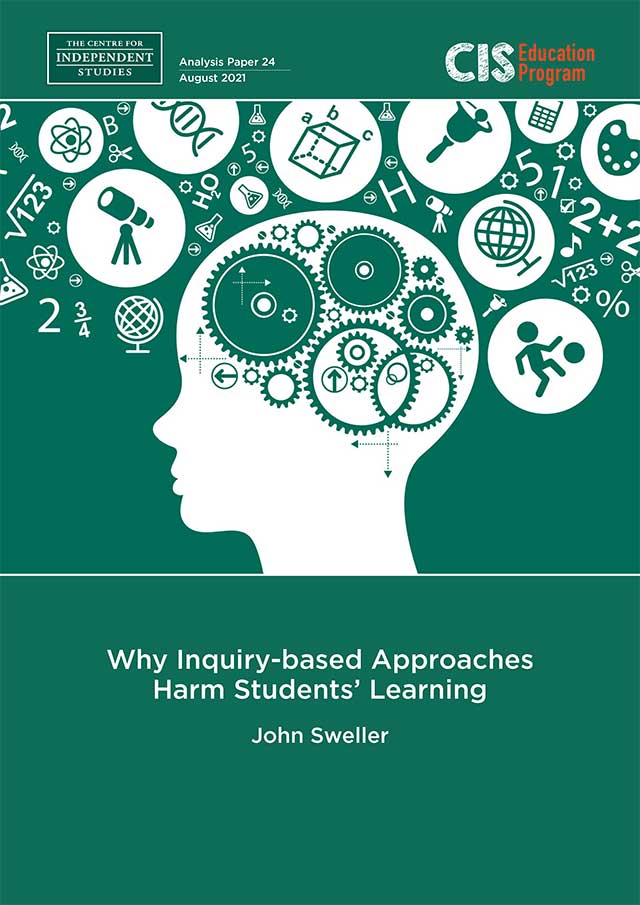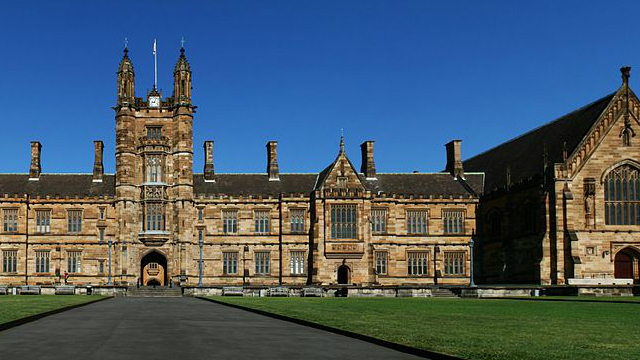
This paper outlines the evidence and scientific reasons that inquiry based learning reduces academic performance.
Why inquiry based learning reduces academic performance: Executive Summary
- Australia’s rankings on international tests such as the Program for International Student Assessment (PISA) have been falling for many years in most curriculum areas. Those falls have been concurrent with an increased emphasis on inquiry learning, discovery learning, problem-based learning (the terms are indistinguishable) and critical thinking in Australian curricula.
- Inquiry learning places an increased emphasis on learners discovering information for themselves rather than having the information explicitly presented to them. This paper suggests a causal relation between the emphasis on inquiry learning and reduced academic performance.
- Inquiry learning was conceived six decades ago based on assumptions that flowed from our understanding of human cognition at that time. Subsequently, it became increasingly popular despite very limited empirical evidence for its efficacy. Simultaneously, with the considerable expansion of our knowledge of human cognition, it has become increasingly difficult to reconcile that new knowledge with the use of inquiry-based approaches.
- There are two broad categories of information. Biologically primary information consists of information that we have specifically evolved to acquire. It is associated with generic-cognitive skills such as the ability to use general problem-solving strategies. We acquire biologically primary skills unconsciously and effortlessly without tuition. They do not need to be taught and are acquired automatically because we have evolved to acquire them. Biologically secondary information includes knowledge that we consider to be culturally important but have not specifically evolved to acquire. Most commonly it consists of domain-specific skills such as how to solve particular types of problems that we learn with conscious mental effort. Schools were invented to teach domain-specific, biologically secondary skills.
- We are able to acquire biologically secondary information slowly and with considerable effort via inquiry learning but can also acquire it far more rapidly and easily via explicit instruction from other people, such as teachers.
- Once novel information has been acquired, it is processed by a working memory that is severely capacity- and duration-constrained, before being transferred to and stored in a large, long-term memory that has no known capacity or duration limits. When faced with appropriate environmental signals, stored information can be transferred back to working memory to generate appropriate action. Working memory has no known capacity or duration limits when it deals with familiar information transferred from long-term memory. That change in the characteristics of working memory when dealing with novel compared to familiar information explains the transformative effects of education.
- Cognitive load theory is an instructional theory based on this cognitive architecture. Using randomized, controlled trials, empirical work flowing from the theory provides considerable evidence for the advantages of explicit instruction over inquiry-based learning. Other work, using correlational studies, has found that the more inquiry-based learning is used in a classroom, the lower the students’ test scores.
- Based on both theory and data, there is little justification for the current emphasis on inquiry learning.
Also by Prof John Sweller: Some Critical Thoughts about Critical and Creative Thinking
SELECTED REFERENCES
Bruner, J. (1961). The art of discovery. Harvard Educational Review, 31, 21-32.
Garnett, S. (2020). Cognitive load theory: A handbook for teachers. Crown House Publishing; Lovell, O. (2020). Sweller’s cognitive load theory in action. John Catt; Sweller, J. (2020). Cognitive load theory and instructional technology. Educational Technology Research and Development, 68, 1-16; Sweller, J., van Merriënboer, J., & Paas, F. (2019). Cognitive architecture and instructional design: 20 years later. Educational Psychology Review, 31, 261-292.
Geary, D. (1995). Reflections of evolution and culture in children’s cognition: Implications for mathematical development and instruction. American Psychologist, 50, 24-37; Geary, D. (2008). An evolutionarily informed education science. Educational Psychologist, 43, 179-195; Geary, D. (2012). Evolutionary Educational Psychology. In K. Harris, S. Graham, & T. Urdan (Eds.), APA Educational Psychology Handbook (Vol. 1, pp. 597-621). American Psychological Association.
Tricot, A., & Sweller, J. (2014). Domain-specific knowledge and why teaching generic skills does not work. Educational Psychology Review, 26, 265-283. https://doi.org/10.1007/s10648-013-9243-1
Newell, A., & Simon, H. A. (1972). Human problem solving. Prentice Hall.
Renkl, A. (2014). Toward an instructionally oriented theory of example-based learning. Cognitive Science, 38, 1-37.
Miller, G. A. (1956). The magical number seven, plus or minus two: Some limits on our capacity for processing information. Psychological Review, 63, 81-97.
Cowan, N. (2001). The magical number 4 in short-term memory: A reconsideration of mental storage capacity. Behavioral and Brain Sciences, 24, 87-114.
Chen, O., Castro-Alonso, J. C., Paas, F., & Sweller, J. (2018). Extending cognitive load theory to incorporate working memory resource depletion: Evidence from the spacing effect. Educational Psychology Review, 30, 483-501. https://doi.org/10.1007/s10648-017-9426-2










